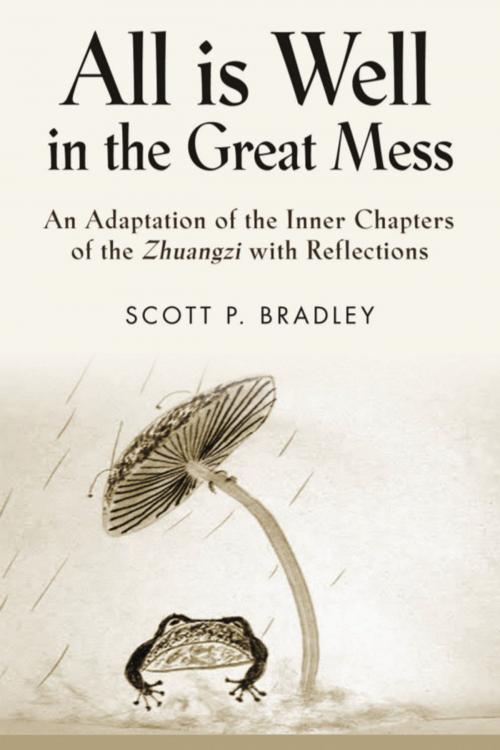ALL IS WELL IN THE GREAT MESS: An Adaptation of the Inner Chapters of the Zhuangzi with Reflections
Nonfiction, Religion & Spirituality, Philosophy, Taoism, Eastern Religions, Health & Well Being, Self Help| Author: | Scott P. Bradley | ISBN: | 9781634907804 |
| Publisher: | BookLocker.com, Inc. | Publication: | September 1, 2015 |
| Imprint: | Language: | English |
| Author: | Scott P. Bradley |
| ISBN: | 9781634907804 |
| Publisher: | BookLocker.com, Inc. |
| Publication: | September 1, 2015 |
| Imprint: | |
| Language: | English |
All is Well in the Great Mess is an adaptation of the Inner Chapters (1-7) of the Book of Zhuangzi with accompanying commentary. These chapters are thought to be the work of the 4th Century BCE Chinese philosopher Zhuangzi (Chuang Tzu). Although traditionally regarded as a Daoist, his philosophy is in fact quite different from that of other proto-Daoist philosophers of his time and what is generally understood as Daoism today. Most significantly, he eschewed all metaphysical speculation in favor of taking our obvious not-knowing as his irremediable point of departure. Nor did he envision any need for the salvation of the individual, humanity or the cosmos. All is ultimately well by virtue of its being at all and we can, therefore, entrust ourselves to whatever the Mystery “is” and to whatever befalls us in life and in death. The apparent messiness of things (from the human point of view) can thus be playfully wandered in without fear of loss. The vicissitudes of life become the opportunity for our soaring freedom, rather than things that impinge upon it. In this way Zhuangzi’s dao affirms all things and all human interpretations of them. Yet, taking human happiness and flourishing as his highest value, he also suggests a path to its fullest realization and critiques those daos that fail to do so. His analysis of the human experience and his suggested response to it presents a non-religious, though deeply mystical, philosophy of life that is as relevant today as it was more than two millennia ago.
Zhuangzi is known for his purposeful ambiguity, playfulness and perplexing irony. This adaptation is an attempt to clarify some of his message and to illuminate the continuity between the many apparently disparate vignettes that make up most of the text. As such, it understands that it is but one possible interpretive exercise and does not believe itself to be definitive. Though the reader will likely find a great deal upon which to ruminate in this adaptation, she or he is also encouraged to grapple with Zhuangzi as found in more literal translations.
All is Well in the Great Mess is an adaptation of the Inner Chapters (1-7) of the Book of Zhuangzi with accompanying commentary. These chapters are thought to be the work of the 4th Century BCE Chinese philosopher Zhuangzi (Chuang Tzu). Although traditionally regarded as a Daoist, his philosophy is in fact quite different from that of other proto-Daoist philosophers of his time and what is generally understood as Daoism today. Most significantly, he eschewed all metaphysical speculation in favor of taking our obvious not-knowing as his irremediable point of departure. Nor did he envision any need for the salvation of the individual, humanity or the cosmos. All is ultimately well by virtue of its being at all and we can, therefore, entrust ourselves to whatever the Mystery “is” and to whatever befalls us in life and in death. The apparent messiness of things (from the human point of view) can thus be playfully wandered in without fear of loss. The vicissitudes of life become the opportunity for our soaring freedom, rather than things that impinge upon it. In this way Zhuangzi’s dao affirms all things and all human interpretations of them. Yet, taking human happiness and flourishing as his highest value, he also suggests a path to its fullest realization and critiques those daos that fail to do so. His analysis of the human experience and his suggested response to it presents a non-religious, though deeply mystical, philosophy of life that is as relevant today as it was more than two millennia ago.
Zhuangzi is known for his purposeful ambiguity, playfulness and perplexing irony. This adaptation is an attempt to clarify some of his message and to illuminate the continuity between the many apparently disparate vignettes that make up most of the text. As such, it understands that it is but one possible interpretive exercise and does not believe itself to be definitive. Though the reader will likely find a great deal upon which to ruminate in this adaptation, she or he is also encouraged to grapple with Zhuangzi as found in more literal translations.















